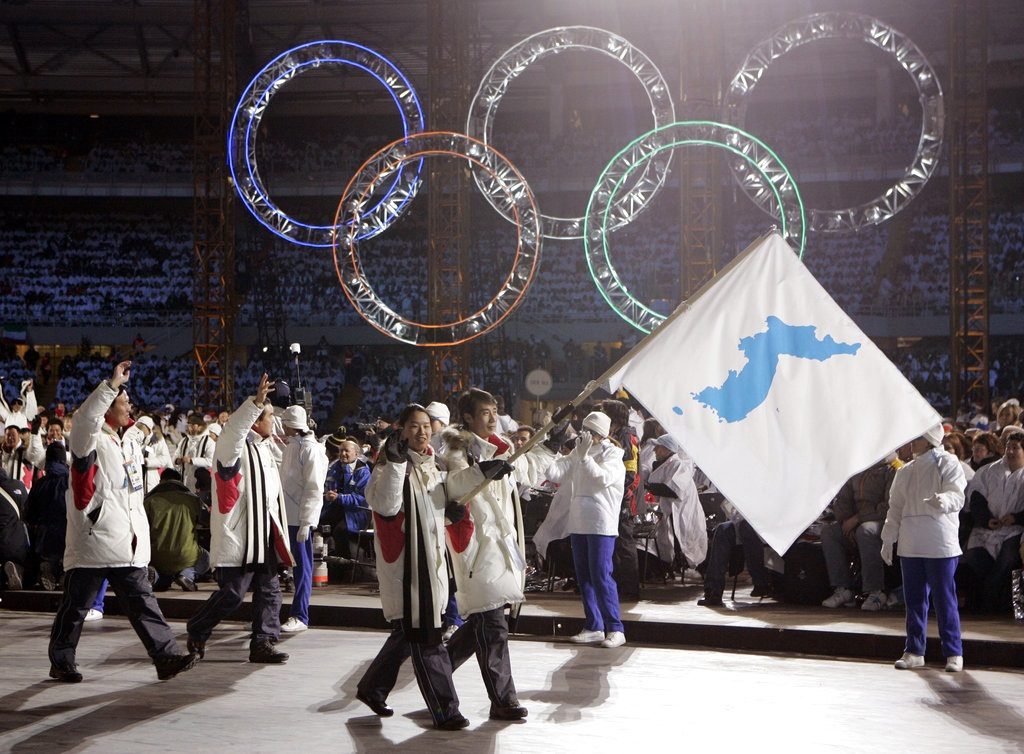Joint Olympic flag deal angers conservatives in South Korea

In this February 10, 2006 photo, Korea’s flag-bearers Bora Lee and Jong-In Lee are carrying a unification flag as they lead their teams into the stadium during the 2006 Winter Olympics opening ceremony in Turin, Italy. When athletes of the rival Koreas walked together behind a single flag for the first time since their 1945 division at the start of the 2000 Sydney Olympics, it was a highly emotional event that came on the wave of reconciliation mood following their leaders’ first-ever summit talks. Eighteen years later, the two Koreas are pushing to produce a similar drama during the upcoming Pyeongchang Olympics. But they have not generated as much enthusiastic supports as they had both at home and abroad. (AP Photo/Amy Sancetta, File)
SEOUL, South Korea – When athletes from the rival Koreas paraded together behind a single flag for the first time at the opening ceremony of the 2000 Sydney Olympics, it was a highly emotional event that came on a wave of hope for reconciliation following their leaders’ first-ever summit talks.
But the two Koreas’ plan to do so again at the upcoming Pyeongchang Olympics this February has not generated much enthusiasm among South Koreans, with many conservatives asking why their athletes cannot carry their own national flag during the first Winter Olympics on their soil.
“We are turning the Pyeongchang Olympics that we’ve got into the Pyongyang Olympics,” said Hong Joon-pyo, leader of South Korea’s main conservative opposition party, referring to North Korea’s capital. “We are dancing to the tune of (North Korean leader) Kim Jong Un’s disguised peace offensive.”
The two Koreas reached a package of Olympics-related rapprochement deals on Wednesday, including marching together at the opening ceremony and fielding their first joint Olympic team in women’s ice hockey. The agreements came after three rounds of talks which began after Kim said in a New Year’s speech that he was willing to send a delegation to the February 9 to 25 Pyeongchang Games.
Many critics are skeptical of Kim’s abrupt overture, believing he may be trying to use the Olympics to weaken United States-led international pressure and sanctions that were toughened after North Korea’s sixth and biggest nuclear test and a series of missile launches in 2017.
Public surveys showed most South Koreans support North Korea’s participation in the Olympics, a chance to create a tentative thaw in the two Koreas’ long-strained relations. But a poll released on Thursday suggests that half of South Koreans oppose a joint flag.
The survey by the private polling group Realmeter indicated how much South Koreans’ view of their northern neighbor has changed because of its expanding nuclear and missile programs since the two countries’ athletes marched together at sporting events during the era of cooperation in the 2000s.
At those events, North and South Korean athletes in the same uniforms entered stadiums behind a “unification flag,” a blue image of the Korean Peninsula on a white background, to the tune of the Korean traditional folk song “Arirang” instead of their individual national anthems. The name displayed during the marches was “Korea,” although the North and South competed separately for medals. Their march at the Sydney Olympics drew a standing ovation, with many spectators shedding tears and the applause continuing until the Koreans finished circling the track.
This week’s agreements require approval from the International Olympic Committee (IOC), which is set to meet officials from the two Koreas and the Pyeongchang organizing committee at its headquarters in Switzerland on Saturday.
If approved, the two Koreas are expected to decide whether they will use the same “unification flag” as in the past, who will carry the flag, what uniforms their athletes will wear, and whether they will use the same folk song.
Despite conservative skepticism, South Korea’s government led by liberal President Moon Jae-in said it hopes the Olympics will provide the two Koreas with a chance to improve their frosty relations.
Government officials said the South Korean national flag will appear at the start of the opening ceremony, regardless of the joint march, and will appear again whenever South Korean athletes win medals.
North Korean Olympic participation “will serve as a chance to warm solidly frozen South-North ties,” Moon said during a visit with South Korean Olympic athletes on Wednesday. “But if we march together or field a single team, I think that can be a further step in developing South-North relations.” /kga